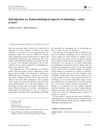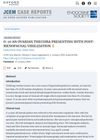1 citations,
January 2020 in “Bioscience Reports” Long-term use of finasteride in women can cause hormonal changes, DNA damage, and menstrual issues.
 1 citations,
December 2018 in “Journal of Cosmetic Dermatology”
1 citations,
December 2018 in “Journal of Cosmetic Dermatology” Men with thinner hair from genetic hair loss may be more likely to have an enlarged prostate.
 1 citations,
October 2018 in “International Journal of Research in Dermatology”
1 citations,
October 2018 in “International Journal of Research in Dermatology” Most women with excessive hair growth in South India have hirsutism without a known cause, with common facial hair growth and some showing hormonal imbalances and polycystic ovaries.
 1 citations,
September 2018 in “Australasian Journal of Dermatology”
1 citations,
September 2018 in “Australasian Journal of Dermatology” A boy with GAPO syndrome had hair loss similar to male pattern baldness without hormone issues, possibly due to skin or blood vessel problems.
 1 citations,
January 2016 in “Journal of Microbial & Biochemical Technology”
1 citations,
January 2016 in “Journal of Microbial & Biochemical Technology” The Free Androgen Index (FAI) is the best indicator of early hair loss in men before age 30.
 1 citations,
September 2015 in “Reviews in Endocrine and Metabolic Disorders”
1 citations,
September 2015 in “Reviews in Endocrine and Metabolic Disorders” The document discusses new insights into how hormones affect male sexual health and related conditions.
 1 citations,
July 2015 in “AACE clinical case reports”
1 citations,
July 2015 in “AACE clinical case reports” Removing both ovaries treated the woman's excess male hormone symptoms.
 1 citations,
February 2014 in “Archiv Der Pharmazie”
1 citations,
February 2014 in “Archiv Der Pharmazie” Carbamates may help treat androgen-dependent conditions by changing how certain lipid enzymes are produced.
1 citations,
August 2013 in “Asian Journal of Pharmaceutical and Clinical Research” Glycyrrhiza glabra extract may prevent hair loss like finasteride.
 1 citations,
December 2010 in “Elsevier eBooks”
1 citations,
December 2010 in “Elsevier eBooks” Cell transplantation faces challenges in genitourinary reconstruction, but alternative tissue sources and microencapsulation show promise.
 1 citations,
January 2009 in “Journal of Clinical Dermatology”
1 citations,
January 2009 in “Journal of Clinical Dermatology” More men have Androgenic Alopecia than women, it's often inherited, and stress can contribute to it.
 1 citations,
November 2007 in “Humana Press eBooks”
1 citations,
November 2007 in “Humana Press eBooks” Most cases of high male hormone levels in women are due to polycystic ovary syndrome.
 January 2009 in “Elsevier eBooks”
January 2009 in “Elsevier eBooks” Some plant-based treatments may help with ovary function, insulin resistance, and excess male hormones in PCOS, but more research is needed to confirm their safety and effectiveness.
January 2025 in “Journal of Controlled Release” A new microneedle patch helps treat hair loss by improving drug delivery to hair follicles.
 January 2025 in “HORMONES”
January 2025 in “HORMONES” Gender-affirming hormone treatments need better patient-focused outcome measurements and standardized data collection.
 January 2025 in “JCEM Case Reports”
January 2025 in “JCEM Case Reports” Ovarian thecomas can cause virilization in postmenopausal women and are treated with surgery.
December 2024 in “International Journal of Molecular Sciences” Targeting CXCL12 may help treat hair loss caused by androgens.
December 2024 in “Tissue and Cell” A new method helps detect androgen receptor movement in cells, aiding research on hair loss treatments.
 October 2024 in “Frontiers in Pharmacology”
October 2024 in “Frontiers in Pharmacology” The correction does not change the conclusion that 2-deoxy-D-ribose helps hair regrowth.
September 2024 in “Journal of Ethnopharmacology” Terminalia bellirica extracts effectively promote hair regrowth and treat androgenetic alopecia.
 July 2024 in “Journal of Pediatric Endocrinology and Metabolism”
July 2024 in “Journal of Pediatric Endocrinology and Metabolism” Ovarian hyperthecosis should be considered in young women with severe male-like symptoms and can be managed with hormone treatments.
 May 2024 in “KIU journal of health science”
May 2024 in “KIU journal of health science” Kolaviron and quercetin may help treat prostate issues.
 February 2024 in “Brain research bulletin”
February 2024 in “Brain research bulletin” Blocking androgen activity in newborn rats affects body weight and appetite-related hormones differently in males and females.
January 2024 in “Medicina” Statins may help treat PCOS by lowering androgen levels and improving cholesterol.

Neurokinin B levels are higher in the placentas of women with PCOS who have female babies.
 January 2024 in “Journal of Natural Remedies”
January 2024 in “Journal of Natural Remedies” Solanum nigrum extract may help regrow hair.
 October 2023 in “IJEM case reports”
October 2023 in “IJEM case reports” A 15-year-old girl with no menstrual period was diagnosed with a genetic condition that makes her body unable to respond to male hormones, leading to female characteristics despite having male genetic makeup.
 October 2023 in “Journal of the Endocrine Society”
October 2023 in “Journal of the Endocrine Society” Losing weight and taking birth control pills can greatly improve severe male hormone excess in women with PCOS.
 August 2023 in “International Journal For Multidisciplinary Research”
August 2023 in “International Journal For Multidisciplinary Research” Ayurvedic treatment, exercise, and a healthy diet can effectively manage PCOD symptoms.
 July 2023 in “Journal of Education, Health and Sport”
July 2023 in “Journal of Education, Health and Sport” Most women lack knowledge about androgens and their excess symptoms.






















